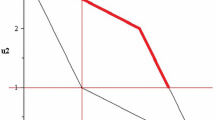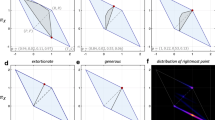Abstract
We consider the infinitely-repeated prisoners' dilemma with lexicographic complexity costs, where transitional complexity between states is included as one aspect of overall strategic complexity. We prove that a full folk theorem obtains in presence of any level of perfection of the equilibrium strategy, if the players consider off-equilibrium path payoff prior to minimizing complexity.
Similar content being viewed by others
References
Abreu D, Rubinstein A (1989) The structure of Nash equilibrium in repeated games with finite automata. Econometrica 56 (6):1259–81
Aumann R (1981) Survey of repeated games. In: Essay in Game Theory and Mathematical Economics in Honor of Oskar Morgenstern, Bibliographisches Institut Mannheim, Wien Zürich 11–42
Banks J, Sundaram R (1990) Repeated games, finite automata and complexity. Games and Economic Behavior 2 (2):97–117
Kalai E (1990) Bounded rationality and strategic complexity in repeated games. In: Game Theory and Applications, Ichiishi, Neyman and Tauman (eds) Academic Press, San Diego 131–157
Kalai E, Neme A (1992) The strength of a little perfection. International Journal of Game Theory 20 (2):335–355
Kalai E, Stanford W (1988) Finite rationality and interpersonal complexity in repeated games. Econometrica 56 (2):397–410
Rubinstein A (1986) Finite automata play the repeated prisoner's dilemma. Journal of Economic Theory 38:83–96
Author information
Authors and Affiliations
Additional information
This work was partially done while the author was visiting at Department of Managerial Economics and Decision Sciences, Kellogg Graduate School of Management, Northwestern University, Evanston, Illinois 60208, USA.
The author gratefully acknowledges the support from CONICET: Consejo de Investigaciones Cientificas y Técnicas, República Argentina. Thanks are given to Ehud Kalai, Alejandro Manelli and anonymous referees of this journal for many helpful discussions and comments. All errors are the author's.
Rights and permissions
About this article
Cite this article
Neme, A. Little perfection and complexity. Int J Game Theory 22, 309–318 (1993). https://doi.org/10.1007/BF01240128
Received:
Revised:
Accepted:
Issue Date:
DOI: https://doi.org/10.1007/BF01240128




